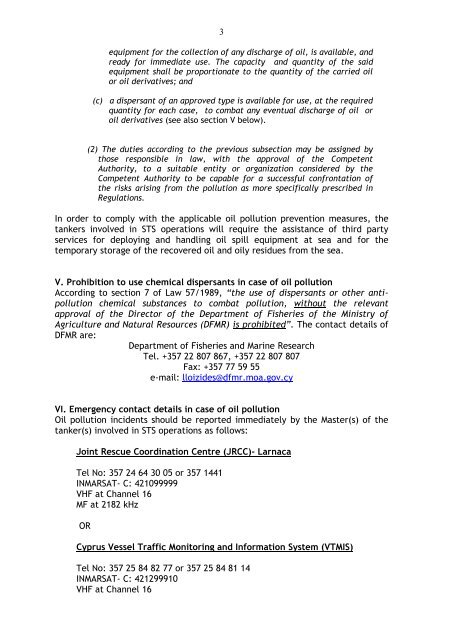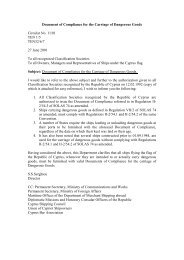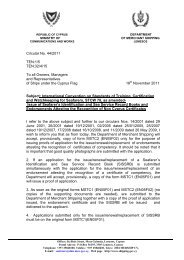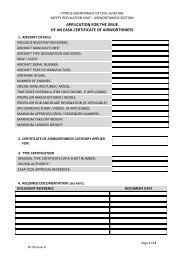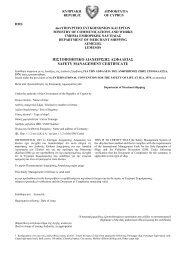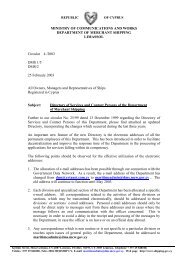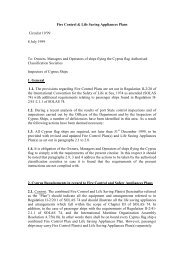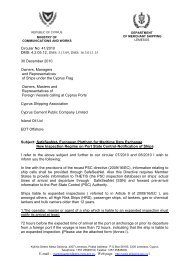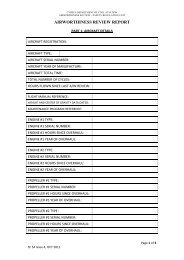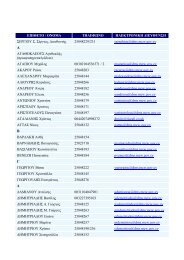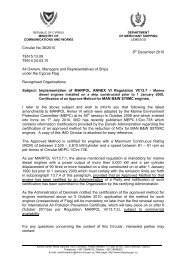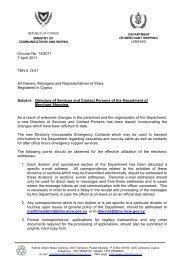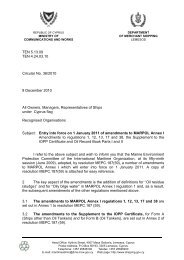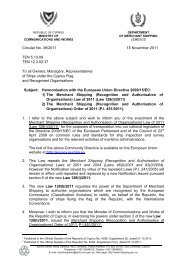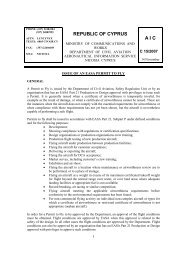Transfer of oil cargo between oil tankers at sea (STS operations)
Transfer of oil cargo between oil tankers at sea (STS operations)
Transfer of oil cargo between oil tankers at sea (STS operations)
You also want an ePaper? Increase the reach of your titles
YUMPU automatically turns print PDFs into web optimized ePapers that Google loves.
3equipment for the collection <strong>of</strong> any discharge <strong>of</strong> <strong>oil</strong>, is available, andready for immedi<strong>at</strong>e use. The capacity and quantity <strong>of</strong> the saidequipment shall be proportion<strong>at</strong>e to the quantity <strong>of</strong> the carried <strong>oil</strong>or <strong>oil</strong> deriv<strong>at</strong>ives; and(c) a dispersant <strong>of</strong> an approved type is available for use, <strong>at</strong> the requiredquantity for each case, to comb<strong>at</strong> any eventual discharge <strong>of</strong> <strong>oil</strong> or<strong>oil</strong> deriv<strong>at</strong>ives (see also section V below).(2) The duties according to the previous subsection may be assigned bythose responsible in law, with the approval <strong>of</strong> the CompetentAuthority, to a suitable entity or organiz<strong>at</strong>ion considered by theCompetent Authority to be capable for a successful confront<strong>at</strong>ion <strong>of</strong>the risks arising from the pollution as more specifically prescribed inRegul<strong>at</strong>ions.In order to comply with the applicable <strong>oil</strong> pollution prevention measures, the<strong>tankers</strong> involved in <strong>STS</strong> oper<strong>at</strong>ions will require the assistance <strong>of</strong> third partyservices for deploying and handling <strong>oil</strong> spill equipment <strong>at</strong> <strong>sea</strong> and for thetemporary storage <strong>of</strong> the recovered <strong>oil</strong> and <strong>oil</strong>y residues from the <strong>sea</strong>.V. Prohibition to use chemical dispersants in case <strong>of</strong> <strong>oil</strong> pollutionAccording to section 7 <strong>of</strong> Law 57/1989, “the use <strong>of</strong> dispersants or other antipollutionchemical substances to comb<strong>at</strong> pollution, without the relevantapproval <strong>of</strong> the Director <strong>of</strong> the Department <strong>of</strong> Fisheries <strong>of</strong> the Ministry <strong>of</strong>Agriculture and N<strong>at</strong>ural Resources (DFMR) is prohibited”. The contact details <strong>of</strong>DFMR are:Department <strong>of</strong> Fisheries and Marine Re<strong>sea</strong>rchTel. +357 22 807 867, +357 22 807 807Fax: +357 77 59 55e-mail: lloizides@dfmr.moa.gov.cyVI. Emergency contact details in case <strong>of</strong> <strong>oil</strong> pollutionOil pollution incidents should be reported immedi<strong>at</strong>ely by the Master(s) <strong>of</strong> thetanker(s) involved in <strong>STS</strong> oper<strong>at</strong>ions as follows:Joint Rescue Coordin<strong>at</strong>ion Centre (JRCC)- LarnacaTel No: 357 24 64 30 05 or 357 1441INMARSAT- C: 421099999VHF <strong>at</strong> Channel 16MF <strong>at</strong> 2182 kHzORCyprus Vessel Traffic Monitoring and Inform<strong>at</strong>ion System (VTMIS)Tel No: 357 25 84 82 77 or 357 25 84 81 14INMARSAT- C: 421299910VHF <strong>at</strong> Channel 16


